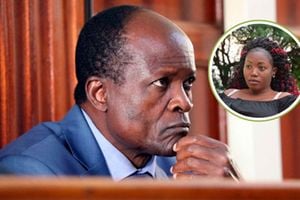
Kenya spent Sh211 million to hire witnesses and experts to defend itself in a case in which a London-based firm sued the Geothermal Development Company (GDC) over a Sh4.2 billion contract to drill 20 geothermal wells.
The National Assembly Committee on Commerce and Energy was told on June 19 that the money was used to hire experts to put up a strong case.
Appearing before the committee yesterday, Solicitor General Shadrack Mose and GDC managing director Paul Ngugi defended the expenditure, saying the stakes were high for both the country and the company.
"We had to ferry some experts from across the world to assist us. It was necessary because of the risk to the country and to GDC," Mr Ngugi told MPs.
Lawmakers, however, questioned how GDC chose Cluff Geothermal, a UK-based company, for the Sh4.2 billion contract.
The lawmakers, led by the committee chairman David Pkosing (Pokot South), questioned the capacity of the company, which according to documents presented to them, did not have the technical capacity to undertake the project.
The MPs challenged Mr Ngugi to produce any report where the company had drilled such wells in any other country to qualify for the contract.
"How was this company identified, where is the feasibility study report that led you to choose this company? This looks like something that was pre-planned to blow our Sh211 million in the London court," said Mr Pkosing.
Mr Pkosing also questioned why the arbitration had to be held in London and not in Kenya when the rules of arbitration are the same in the country.
"There could have been some mischief here, it defies logic to go to London when we had the capacity to have the matter heard here in Kenya. We could have saved Sh211 million," said Mr Pkosing.
It was also revealed that GDC never sought the advice of the Attorney General when entering into the contract.
Mr Mose confirmed to the committee that the State Law Office was indeed not involved in the contract and only became involved when there was a dispute.
"Our advice was not sought, we came in at the arbitration stage when we saw serious danger on the part of the government," Mr Mose said.
Kangema MP Peter Kihungi said there was negligence on the part of the GDC in the way the contract was drafted that led to the arbitration case being heard in London.
"Our state agencies need to be careful with the contracts they sign because it appears that this contract was drafted by the contractor and given to GDC to sign," Mr Kihungi said.
Other MPs Mwangi Kiunjuri (Laikipia East) and Marianne Kitany (Aldai) said it was clear that the contract was designed for a particular company and meant to siphon off public funds.
But Mr Ngugi defended the UK-based company, saying the kind of services they were looking for could not be sourced locally.
"We had a technical problem and we needed a technical solution, so we put our needs out there," Mr Ngugi said.
According to the contract, each well was to be drilled (top-hole) to a measured true vertical depth of 1,000 metres or a total true vertical depth of at least 2,000 metres.
In 2013, GDC entered into a contract to provide drilling services for 20 geothermal wells at its Menengai geothermal field at a cost of Sh4.2 billion.
The procurement was advertised in November 2012 and five companies submitted bids. The companies included Cluff geothermal, PR Marriott drilling, Great Wall drilling company, Hansa engineering Ltd and Geothermal Exploration Ltd.
By the time the tender closed on 28 December 2022, only three companies had responded by presenting their proposals. These were PR Marriott drilling, Cluff geothermal and Great Wall drilling company.
The bids were opened at GDC's Riverside office at 2 pm on December 28.
However, only the technical bids were opened by the Tender Opening Committee, which MPs said was suspicious as they claimed the committee already had a company in mind.
In terms of technical capacity, the tender committee chose Cluff Geothermal Renewable Energy Ltd, which it said was the only qualified bidder at that stage.
After passing the technical stage, the documents submitted to the committee state that Cluff Geothermal Renewable was therefore qualified for the next stage, which was the financial evaluation.
According to the documents, the financial proposal was opened by the tender committee at 11am in January 2013 at the GDC Riverside office.
Another committee was later formed to further evaluate the companies' drilling costs, infrastructure costs, supply of drilling materials and consumables, and training.
"Upon completion of the evaluation, the evaluation committee recommended, among other things, that M/S Geothermal Renewable Energy be awarded the contract for the provision of top-drilling services for 20 geothermal wells at an estimated evaluated cost of USD 44,535,695 inclusive of taxes," the documents state.
However, due to financial challenges, Cluff Geothermal and its local partners abandoned the work, suspended operations and demobilised the drilling crew and equipment on June 23, 2016, and began charging standby fees even after its personnel had demobilised from the site.
A dispute then arose after the parties disagreed on issues such as the amount of work completed and outstanding invoices, which led the contractor to suspend its drilling operations in March 2015 and, on April 15, 2017, file a notice of arbitration with the LCIA seeking an amount of Sh2.7 billion in unpaid invoices for the period from March 2015 to June 2016, damages in the form of lost profits and consequential losses relating to the late payment of certain invoices.
Cluff also threatened to bring an action against Kenya under the Agreement for the Promotion and Protection of British Investment in Kenya signed in September 1999.
Mr Ngugi said the Attorney General took over the case and appeared for and on behalf of GDC before the LCIA and appointed a co-counsel to handle the matter.
On June 3, the LCIA ruled that GDC should pay the claimants the sum of Sh232 million in respect of invoices issued for work done and a further Sh61 million in interest.
Former Attorney General Kihara, Solicitor General Ken Ogeto and a British lawyer, Michael Sullivan QC, represented Kenya in the London arbitration.








